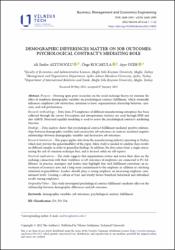DEMOGRAPHIC DIFFERENCES MATTER ON JOB OUTCOMES: PSYCHOLOGICAL CONTRACT'S MEDIATING ROLE
Citation
Altunoğlu, A. E., Kocakula, Özge, & Özer, A. (2022). Demographic differences matter on job outcomes: psychological contract’s mediating role. Business, Management and Economics Engineering, 20(1), 1–22. https://doi.org/10.3846/bmee.2022.14895Abstract
Purpose - Drawing upon prior researches on the social exchange theory, we examine the effect of employee demographic variables on psychological contract fulfillment, which eventually influences employee's job satisfaction, intention to leave, organizational citizenship behavior, cynicism, and task performance.
Research methodology - Data from 274 employees of different manufacturing enterprises has been collected through the survey. Description and interpretation statistics are used through SPSS and also AMOS. Structural equality modeling is used to assess the psychological contract's mediating function.
Findings - Data analysis shows that psychological contract fulfillment mediated positive relationships between demographic variables and constructive job outcomes; in contrast, mediated negative relationships between demographic variables and destructive job outcomes.
Research limitations - This paper applies data from the manufacturing industry operating in Turkey, which may prevent the generalizability of the paper. More study is needed to confirm these results on different samples in order to generalize findings. In addition, the data comes from a single source, raising the risk of common technique bias, and is focused solely on self-reports.
Practical implications - The study suggests that organizations review and revise their ideas on the exchange connection with their workforce as job outcomes of employees are connected to PC fulfillment. In practice, managers and leaders may highlight that such fulfillment constitutes an investment of resources into and a long-term commitment to the employee in addition to satisfying relational responsibilities. Leaders should place a strong emphasis on increasing employee commitment levels. Creating a culture of trust and loyalty fosters beneficial behavioral and attitudinal results among employees.


















